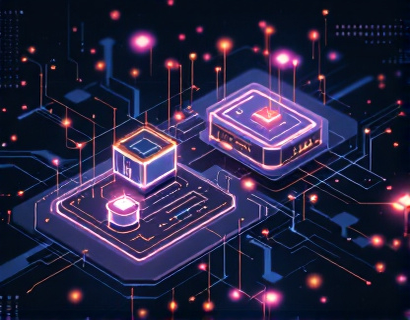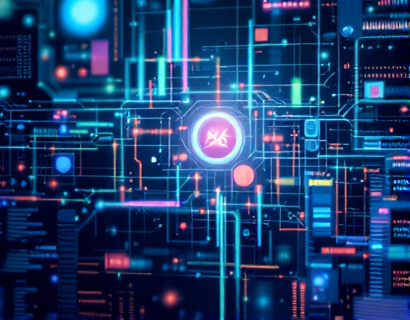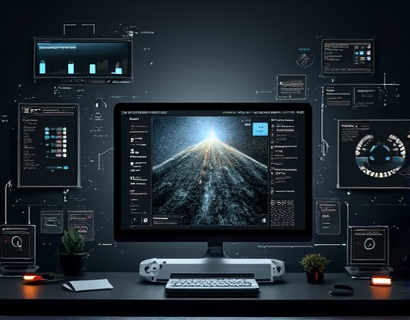Unlocking Blockchain's Potential: A Comprehensive Guide to Next-Gen Digital Currency and Token Creation Software
In the rapidly evolving landscape of digital finance, blockchain technology stands out as a revolutionary force, offering unprecedented levels of security, transparency, and efficiency. At the heart of this transformation are advanced software tools designed to simplify the creation and management of custom tokens and currencies. This guide delves into the intricacies of these tools, exploring how they unlock the full potential of blockchain for both novices and experts. By focusing on unparalleled customization, robust security, and seamless scalability, we aim to make blockchain technology accessible and straightforward.
Understanding Blockchain and Digital Currencies
Before diving into the software tools, it's essential to grasp the fundamentals of blockchain and digital currencies. Blockchain is a decentralized ledger technology that records transactions across multiple computers in such a way that the registered transactions cannot be altered retroactively. This inherent feature ensures transparency and security, making it ideal for creating digital currencies and tokens.
Digital currencies, often referred to as cryptocurrencies, are virtual or digital forms of money that use cryptography for security. They operate independently of a central bank and are typically decentralized, meaning no single entity controls the entire network. Tokens, on the other hand, are a subset of digital currencies that represent a specific asset or utility within a blockchain ecosystem. They can be used to represent ownership, access rights, or even as a medium of exchange.
The Need for Specialized Software
The process of creating and managing digital currencies and tokens is complex, involving multiple technical steps. To navigate this landscape effectively, specialized software tools are indispensable. These tools streamline the development process, ensuring that users can focus on innovation rather than getting bogged down by technical intricacies. The right software can provide customization options, enhance security, and ensure scalability, making blockchain technology more approachable.
Customization Options
One of the key advantages of using specialized software is the level of customization it offers. Each digital currency or token project has unique requirements, and the ability to tailor the blockchain platform to these needs is crucial. Customization can include designing the token's supply, transaction fees, and reward mechanisms, as well as integrating specific features like smart contracts or governance models. Advanced software tools provide intuitive interfaces and comprehensive settings, allowing users to create tokens that perfectly align with their vision.
Robust Security Measures
Security is paramount in the world of blockchain and digital currencies. Specialized software incorporates state-of-the-art security protocols to protect against various threats, including hacking, fraud, and data breaches. These measures include cryptographic algorithms, multi-signature wallets, and regular security audits. By leveraging these security features, users can ensure that their digital assets are safeguarded, building trust and confidence among users and stakeholders.
Seamless Scalability
As digital currency and token projects grow, the underlying infrastructure must scale to handle increased demand without compromising performance. Scalability is a critical factor in the success of any blockchain project. Advanced software tools are designed to handle high transaction volumes and support the expansion of the network as needed. This ensures that the platform remains efficient and reliable, even as the user base and transaction activity grow.
Key Features of Advanced Token Creation Software
To fully leverage the potential of blockchain technology, it's important to understand the key features offered by advanced token creation software. These features not only simplify the development process but also enhance the functionality and appeal of the resulting digital currencies and tokens.
User-Friendly Interfaces
A user-friendly interface is essential for making blockchain technology accessible to a broader audience. Advanced software tools often come with intuitive dashboards and step-by-step guides, making it easier for users to navigate the creation and management process. This accessibility is particularly beneficial for those new to blockchain, as it reduces the learning curve and encourages more people to explore this innovative space.
Comprehensive Documentation and Support
Robust documentation and support are critical components of any software solution. Comprehensive guides, tutorials, and community forums provide valuable resources for users, helping them overcome challenges and optimize their projects. Many advanced tools offer 24/7 support, ensuring that users can get assistance whenever they need it. This level of support is invaluable for maintaining project momentum and addressing technical issues promptly.
Integration Capabilities
Integration with existing systems and platforms is another key feature of advanced token creation software. The ability to seamlessly integrate with wallets, exchanges, and other blockchain applications enhances the usability and reach of the digital currency or token. This interoperability ensures that users can easily interact with the token across different ecosystems, broadening its adoption and utility.
Smart Contract Support
Smart contracts are self-executing contracts with the terms of the agreement directly written into code. They automate and enforce the execution of contractual obligations, reducing the need for intermediaries and increasing efficiency. Advanced software tools often include built-in support for smart contracts, allowing users to create complex and dynamic tokens with specific functionalities. This feature opens up a world of possibilities, from decentralized finance (DeFi) applications to governance models and more.
Case Studies and Real-World Applications
To better understand the practical applications and benefits of advanced token creation software, let's explore a few real-world examples. These case studies highlight how different projects have leveraged these tools to achieve their goals and drive innovation in the blockchain space.
Decentralized Finance (DeFi) Platforms
One prominent example is the development of decentralized finance (DeFi) platforms. These platforms aim to provide financial services such as lending, borrowing, and trading without traditional financial intermediaries. By using advanced token creation software, developers can design custom tokens that serve as native assets within their DeFi ecosystems. These tokens can facilitate transactions, reward users for participation, and govern the platform's operations. The result is a more inclusive and accessible financial system, open to anyone with an internet connection.
Non-Fungible Tokens (NFTs)
Non-Fungible Tokens (NFTs) have gained significant traction in recent years, particularly in the art and collectibles market. NFTs represent unique digital assets, each with its own set of attributes and ownership records. Advanced software tools enable creators to mint and manage NFTs with precision, ensuring that each token is distinct and verifiable. This has opened new avenues for artists, collectors, and enthusiasts, transforming how digital assets are created, traded, and valued.
Community-Driven Projects
Community-driven projects are another area where advanced token creation software shines. These projects often aim to build decentralized communities around a shared vision, with tokens serving as a means of participation and governance. By using specialized software, project leaders can create tokens that incentivize community engagement, reward contributors, and facilitate decision-making processes. This approach fosters a sense of ownership and collaboration, driving the project's success and sustainability.
Future Trends and Innovations
The landscape of blockchain and digital currencies is constantly evolving, with new trends and innovations emerging regularly. Staying ahead of these developments is crucial for anyone looking to harness the full potential of blockchain technology. Here, we explore some of the key trends shaping the future of digital finance.
Interoperability and Cross-Chain Solutions
Interoperability, or the ability of different blockchain networks to communicate and exchange value, is becoming increasingly important. Cross-chain solutions enable tokens and assets to move seamlessly between different blockchains, enhancing flexibility and expanding the ecosystem. Advanced software tools are beginning to incorporate interoperability features, making it easier for developers to create tokens that can function across multiple platforms.
Sustainability and Environmental Impact
The environmental impact of blockchain technology, particularly proof-of-work (PoW) consensus mechanisms, has been a growing concern. In response, there is a shift towards more sustainable consensus algorithms, such as proof-of-stake (PoS) and proof-of-authority (PoA). Advanced software tools are adapting to these changes, offering options for creating tokens that are more environmentally friendly. This trend not only addresses environmental concerns but also aligns with the values of a growing number of users and investors.
Regulatory Compliance and Legal Frameworks
As digital currencies and tokens gain mainstream acceptance, regulatory frameworks are evolving to address the unique challenges they present. Compliance with these regulations is essential for the long-term success of any blockchain project. Advanced software tools are beginning to incorporate features that help developers navigate the regulatory landscape, ensuring that their tokens meet the necessary legal requirements. This proactive approach can mitigate risks and facilitate smoother adoption.
Conclusion
Unlocking the full potential of blockchain technology for digital currency and token creation requires the right tools and a deep understanding of the underlying principles. Advanced software solutions offer unparalleled customization, robust security, and seamless scalability, making blockchain accessible and powerful for all users. By leveraging these tools, developers and innovators can create innovative financial products that transform the way we think about money and value. As the landscape continues to evolve, staying informed and adaptable will be key to success in the dynamic world of digital finance.










































